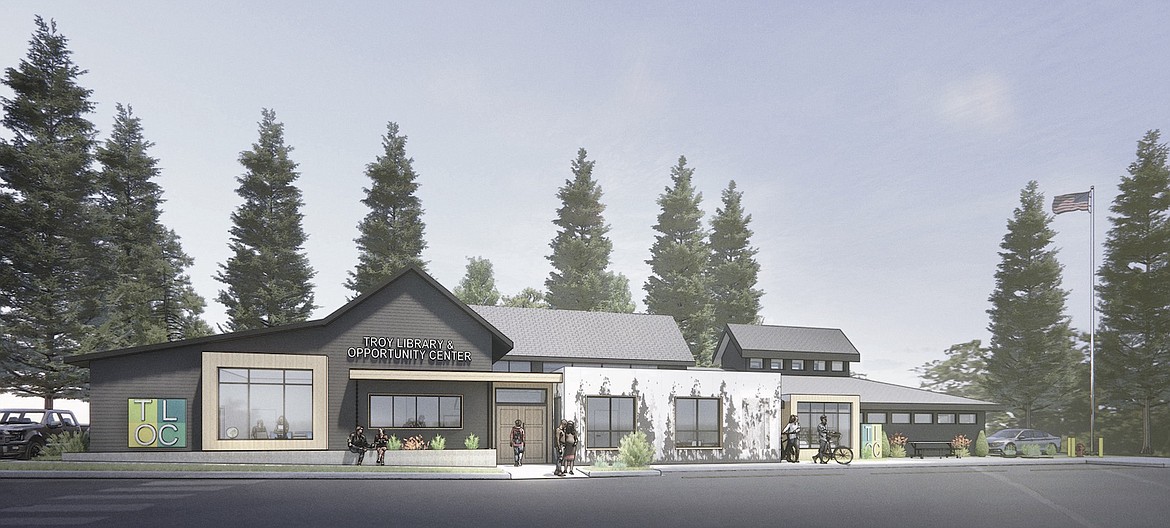Troy Library and Opportunity Center plans unveiled
Efforts to revamp the Troy Library are gaining momentum.
The architect hired to build design plans for the new facility recently unveiled them at a community dinner.
Initial design plans for the Troy Library and Opportunity Center were revealed at a community dinner held at the Lincoln County Library's Troy branch on March 14.
Partners Zero to Five Lincoln County, Unite for Youth, Troy Friends of the Library and Lincoln County Victim Witness Advocates were there in celebration of the project milestone.
Guests were shown plans that included community meeting rooms, public office space, a demo kitchen, tech lab/maker space, teen area and early literacy spaces, in addition to typical quiet library reading spaces.
The dinner conversation was robust when guests responded to questions about how they could envision themselves interacting with the spaces, but when asked what is missing from the design there was little input.
“I think that makes this project design a win. The TLOC (Troy Library Opportunity Center) team has put in a lot of effort into community outreach and we have really tried to listen to the community's wants and needs and plan accordingly. It seems as if we have been successful,” said Sharee Miller, Troy Librarian.
Mosiac Architects revealed the design as part of the Primary Architect Report their firm was hired to complete in August 2022 by Lincoln County Government and Lincoln County Troy Libraries using Community Block Development Grant funding. The full report is due out by May 2023.
TLOC specific spaces are available beyond library hours in order to provide expanded access to the community for special events, classes and meetings.
Additional programming requirements, such as “the teen space shall be located next to the tech lab” and “the children’s play space shall double as the story time area,” encourage impromptu learning and opportunities for children and at-risk youth.
Each space in TLOC goes beyond satisfying specific programmatic requirements, and in this way, TLOC is very similar to a residential home.
Rooms in a residential home consistently do more than what they were designed to do, for instance a kitchen is a gathering space and a dining room is also space for playing board games.
The same philosophy is applied to TLOC spaces. The TLOC kitchen is more than a space for programmed cooking classes – it’s a place for gathering, doing homework, and crafts.
The “Commisioner’s Corner” in front of the Public Service Office is more than a waiting area – it’s also a place to read the newspaper, catch up with neighbors and learn about community events.
Each space in TLOC wears multiple hats, and when viewed together as a whole, make a welcoming home for the community
The TLOC project is a grass roots effort to expand the Troy Library branch and build community center spaces spurred by work groups stemming from community listening sessions performed by Montana Economic Developers Association in 2020, and Montana Needs Assessment in 2017.
This needed community asset will reduce barriers in accessing services and resources and will improve health, social and economic outcomes for the citizens of Troy, Bull River, Yaak and surrounding remote areas.
According to planners, the existing conditions of the ambulance barn are problematic for reuse. The prior use as an ambulance barn requires extensive modification before the public can safely occupy it as a learning facility.
Significant structural upgrades are required, the building has virtually no mechanical system besides unit heaters, all building finishes are in need of replacement, and the entry and interior spaces are not ADA accessible.
The floor level is higher than the library and the interior walls are structural bearing walls and these conditions significantly limit space planning opportunities.
Most significantly, the constraints identified above limit the design so that the existing library staff would not be able to manage or oversee the new community spaces and the library at the same time. This is problematic from a safety and security standpoint, but it is also problematic from a financial standpoint as the library’s budget cannot support added staff.
Structural, architectural, and operational assessments indicate it is more economical to demolish and build new rather than remodel the existing structure.
Project Partners Lincoln County Unite for Youth, Spring Up Troy, Libby Job Service, Zero to Five Lincoln County, Western Montana Mental Health, Lincoln County Commissioners and others have been meeting monthly, collaborating and pooling resources for the past three years.
Next steps for the team are to move into the capital funding campaign and flesh out a sustainability plan for the facility.
More information can be obtained at www.lincolncountylibraries.com/TLOC

